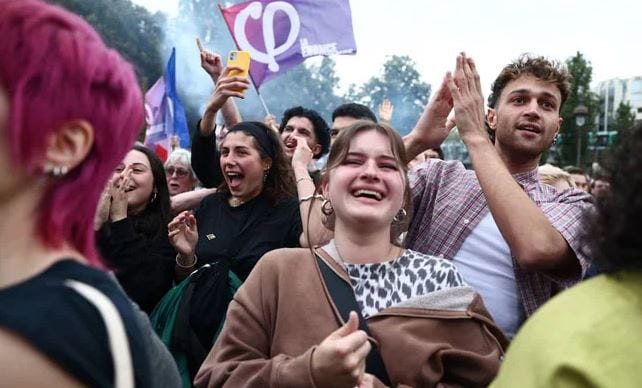PARIS – France is due for political uncertainty after Sunday’s elections resulted in a hung parliament, with a leftist alliance unexpectedly leading ahead of the far right, but no group secured a majority.
The voters dealt a setback to Marine Le Pen’s National Rally (RN), which had been projected to win second place but ended up in third, according to polling projections.
President Emmanuel Macron, who called the snap election to clarify the political landscape, now faces a highly fragmented parliament, potentially weakening France’s role in the EU and globally and complicating domestic policymaking.
The election has divided parliament into three main groups—leftists, centrists, and the far right—with divergent platforms and no history of collaboration.
The leftist New Popular Front (NFP), advocating for price controls on essentials, a higher minimum wage, and other reforms, expressed its intention to govern immediately. “The will of the people must be respected,” said Jean-Luc Melenchon, leader of the hard-left.
Despite celebrations among left-wing supporters in Paris, concerns remain over the alliance’s ability to secure an absolute majority in the 577-seat assembly.
The official results are pending but polling agencies predict the leftists could secure 184-198 seats, Macron’s centrists 160-169, and the RN and allies 135-143.
Financial markets reacted cautiously to the news, with the euro initially falling, reflecting concerns about potential political gridlock until at least 2025.
Prime Minister Gabriel Attal announced his resignation but will continue in a caretaking role.
The challenge now is whether the leftist alliance can maintain unity and agree on a governing strategy, amid calls for dialogue and cooperation across ideological lines.
Macron’s next steps remain unclear, with discussions expected to focus on forming a coalition capable of securing a governing majority.
For the RN, the election outcome was disappointing despite making gains, as anti-RN alliances successfully coordinated efforts to block its advance.
Looking ahead, Le Pen sees the election as laying groundwork for future successes, reaffirming her candidacy for the 2027 presidential election.
Voters’ dissatisfaction with Macron’s administration, particularly over cost of living and public service issues, fueled support for the RN, underscoring ongoing challenges for the ruling party.
Despite the setback, France faces a period of political uncertainty with implications for both domestic policies and its international standing.










